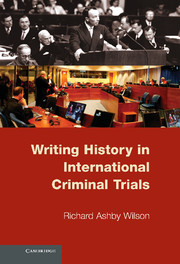Book contents
- Frontmatter
- Contents
- Epigraph
- Preface and Acknowledgments
- Figures and Tables
- Glossary
- 1 Assessing Court Histories of Mass Crimes
- 2 What Does International Actually Mean for International Criminal Trials?
- 3 Contrasting Evidence: International and Common Law Approaches to Expert Testimony
- 4 Does History Have Any Legal Relevance in International Criminal Trials?
- 5 From Monumental History to Microhistories
- 6 Exoneration and Mitigation in Defense Histories
- 7 Misjudging Rwandan Society and History at the International Criminal Tribunal for Rwanda
- 8 Permanent Justice: The International Criminal Court
- 9 Conclusion: New Directions in International Criminal Trials
- Appendix: Methodology and the Survey Instrument
- Bibliography
- Index
5 - From Monumental History to Microhistories
Published online by Cambridge University Press: 05 June 2012
- Frontmatter
- Contents
- Epigraph
- Preface and Acknowledgments
- Figures and Tables
- Glossary
- 1 Assessing Court Histories of Mass Crimes
- 2 What Does International Actually Mean for International Criminal Trials?
- 3 Contrasting Evidence: International and Common Law Approaches to Expert Testimony
- 4 Does History Have Any Legal Relevance in International Criminal Trials?
- 5 From Monumental History to Microhistories
- 6 Exoneration and Mitigation in Defense Histories
- 7 Misjudging Rwandan Society and History at the International Criminal Tribunal for Rwanda
- 8 Permanent Justice: The International Criminal Court
- 9 Conclusion: New Directions in International Criminal Trials
- Appendix: Methodology and the Survey Instrument
- Bibliography
- Index
Summary
THE RISING TIDE OF JUDICIAL FRUSTRATION
After the trial of Slobodan Milošević, there was a precipitous decline in historical debate at the ICTY, as the managerial judging model gained traction and transformed the way in which prosecutors presented evidence in trials. The cracks had already started appearing during the interminable Milošević trial itself, and the ICTY's completion strategy resulted in more pressure on prosecutors to reduce the size of their cases, from the number of municipalities included in the indictment to the number of witnesses called in a trial. Aware of the growing impatience at the UN Security Council, and admonished by the Tribunal President Jorda, Trial Chamber judges openly vented their frustration with the historical contest playing out before them. During the day and a half of Audrey Budding's testimony on 23–24 July 2003, Judge Richard May interrupted the proceedings fifteen times, encouraging the parties to “move on” or “go on” and asking repeatedly, “What is the question?”
Judge May's irritation was primarily directed at the disruptive defendant but at times implied a broader disdain for any historical deliberations, as when he scolded Milošević for lingering over the finer points of Serbian nationalism in the early twentieth century: “You have spent the best part of three hours arguing with the witness mainly on, as far as I can see, totally irrelevant matter.” The matter would seem irrelevant for the trier of fact, perhaps.
- Type
- Chapter
- Information
- Writing History in International Criminal Trials , pp. 112 - 139Publisher: Cambridge University PressPrint publication year: 2011

